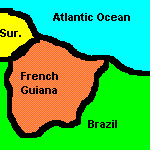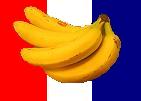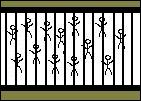French Guiana
"Guiana de Franchese" "French Overseas Territory under Brazilian and Norwegian Joint Administration" French Guiana | |||||
|---|---|---|---|---|---|
| |||||
| Motto: Gallia est divisa in partes tres ("If you don't behave, we'll put ya in The Hole.") | |||||
| Anthem: "(I've Been Working on the) Chain Gang" | |||||
 | |||||
| Capital | Devil's Island | ||||
| Largest city | Paris | ||||
| Official language(s) | French | ||||
| Government | Bureaucratic | ||||
| Warden | Leopold N. Loeb | ||||
| Currency | Cigarette | ||||
| Area | 4,800,000 sq. mi. | ||||
| Calling code | 911 | ||||
French Guiana is the the southernmost country in Europe. Home to the Devil's Island prison, it is notable for its three main exports: bananas and parolees, and spacejunk. French Guiana is well-known for being a place nobody's heard of, not even by the people who live there. Not even the French care about it, and for most of their history they have long forgotten it exists. In that respect, it's kind of like the French version of Alaska, only better because of a lack of Sarah Palin.
History[edit | edit source]
The land that makes up French Guiana today was originally discovered by the English explorer Franz Studebaker in the late 1700's. Studebaker had originally set out from England to find a shorter route by sea to the African nation of French Guinea. Halfway through the voyage, however, a storm blew the ship off course, sending the vessel westward towards the coast of South America. When the ship reached the shore, Studebaker stepped off the boat convinced he had reached his destination. After exploring the area for several days, he then proceeded to draw a map of the place. Being a poor speller, though, he marked the territory on his map "French Guiana". Unable to return to England (because his crew members had eaten each other when the food ran out during the long voyage), Studebaker died from scurvy several years later without ever having known that he had not reached his intended destination. (Mrs. Studebaker was pretty steamed about this too, because she had kept his dinner warm in the oven and was angry that he never called to say he would be late.)
Another significant event in the history of French Guiana came in 1851, when an incident occurred aboard a ship containing English convicts bound for a penal colony in Australia. In an uprising, the prisoners-to-be murdered the captain and crew and took control of the voyage. However, because none of them knew how to steer the ship, the vessel drifted at sea for over a month before finally crashing onto the shoreline in an area not far from where Studebaker had landed several decades before. Finding Studebaker's remains and his rudimentary map still intact, the survivors of the shipwreck proclaimed that the were no longer British citizens but founders of the new nation of French Guiana. In this new country, the convicts set out to create a new life for themselves. They immediately began construction of a prison made from wood which was their temporary home while they set about constructing a permanent correctional facility out of stone. In 1854, with the structure completed, the convicts then took up residence in their new home which they named "Devil's Island".
Devil's Island[edit | edit source]
In the years that followed, the population of French Guiana grew by leaps and bounds. Word spread among inmates in many countries about the amenities offered by the Devil's Island prison (cable TV, free weights), and many prisoners asked to be transferred to the facility. By the mid-1970's, the population of the prison grew to over 100,000 inmates, with several new wings of the prison being built to accommodate all of the new arrivals.
However, because of the population of the country was almost entirely incarcerated (aside from a small aboriginal population which engaged in banana farming), the prisoners were also responsible for staffing the facility. A prisoner's typical workday would consist of 8 hours of hard labor (breaking rocks in the hot sun, for example) followed by 8 hours of guard duty.
The Great Banana Riot of 1978[edit | edit source]
The prison faced a major crisis in the aftermath of Hurricane Elvis, which swept through the Caribbean in 1978. The banana crop in French Guiana was almost entirely destroyed by the storm, and this had an serious impact on the prisoners, since this was their only source of food. The existing supply of bananas in the prison had to be rationed, and after several weeks the only bananas that remained were dark brown and extremely mushy.
On Christmas Day of 1978, conditions reached a boiling point in the facility over the banana issue. That day, prisoners were herded in the dining area to receive their portion of bananas for the day. One inmate, upon receiving a plateful of rotten, moldy bananas, became enraged and started shouting "Ces bananes sont merde, M-E-R-D-E!" ("These bananas are shit, S-H-I-T!"). Other inmates joined in and started chanting the phrase over and over. At one point, an inmate flung a moldy banana at a guard, triggering a massive food fight that eventually turned into a full scale riot.
The situation then turned uglier as the prisoners then took the warden and several guards hostage, demanding that a new shipment of fresh bananas be sent to the prison immediately. These demands were transmitted to outside world, and soon TV and radio news organizations sent reporters to French Guiana to cover the story. The United States, eager to take the country's mind off the Carter presidency, flew in the actor Steve McQueen (who had once spent several years at Devil's Island for a reckless driving conviction) to negotiate with the leader of the prisoners. McQueen worked out a settlement with the leader in which the inmates would release the hostages in return for the right to make a statement on television. In the brief televised statement, the leader (nicknamed "Cats") repeated the prisoners' complaint that "Ces bananes sont merde!". However, his words were incorrectly translated for English-speaking audiences and the caption instead read: "This shit is bananas!" which many viewers found confusing. (It should be noted that a sample of this phrase was later used by the rock group Hoobastank in their hit single "Stefani Girl".) With a new shipment of bananas on the way, the inmates released the hostages and order was resolved. McQueen later wrote about this incident in the book Devil's Island, or 120 Days of Sodom, or 90 Days With Time Off For Good Behavior.
Annexation of France[edit | edit source]
In an attempt to expand its national boundaries (because they were running out of room for the prison), French Guiana went to war with France in 2002 in an attempt to annex France's territory. Even though nearly the entire population of French Guiana was incarcerated, France quickly surrendered, and French Guiana took control of the country. The government immediately seized EuroDisney, with plans to tear it down and replace it with a new correctional facility, but work on that project had not begun as of 2005. I'm just fuckin joking, French Guiana is independent!





